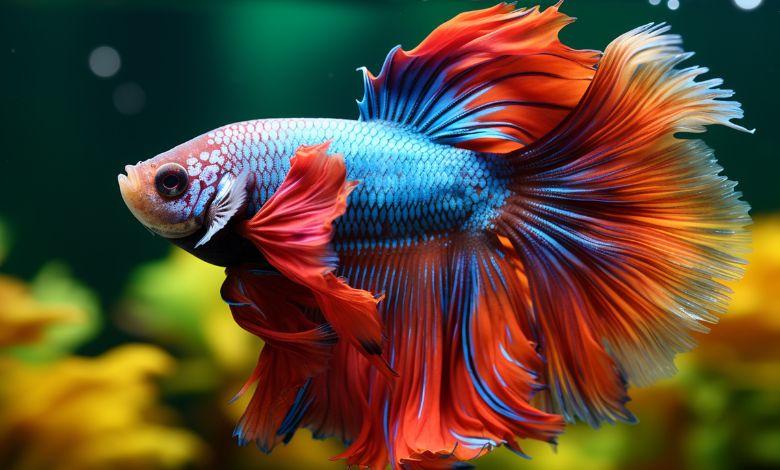Wondering how long a betta fish goes without food? Learn the safe limits, real tips, and how to care for your betta while away.
I was in my kitchen, suitcase by my side, ready to take off on that much-needed weekend escape. When I reached for my cell-phone charger, I noticed my betta fish, Zeus, swimming lazily in his tank as though it was his domain. Suddenly, it struck me.
I forgot to prepare food for him.
Instill panic.
If you’ve caught yourself Googling, how long is a betta fish without food perhaps getting ready for a vacation, forgetting to replace the flakes, or you just want to know because you’re curious you’ve come to the right spot. I’ve been here myself (more than once), and I’ve researched, felt guilty, and discovered the most optimal answers.
Much like using a reel without anti reverse skipping steps in preparation can lead to unexpected outcomes and your fish, just like your gear, deserves a smooth experience.
Well, let’s take the plunge (sorry, couldn’t resist) and cover what actually occurs when your betta fish misses a meal or two or maybe even more.
Article Breakdown
Quick Answer: How Long Can a Betta Fish Survive Without Food?
Let’s get down to business — because if you’re like I was that morning, you’re likely looking for a direct answer quickly.
A healthy adult betta can last without food for as long as 10–14 days.
Just because they can do something is no reason they should. Ideally, no more than 3-5 days
should pass without you feeding your betta.
Curious how long a betta will last without eating in poor conditions? The answer varies by age, water, and health, but anything longer than a week is a cause for concern.
Now that we’ve eased that initial panic, let’s discuss how and why betta can survive for that long without eating, what will happen when they do, and how you should act if you’ll be absent.
Why Can Betta Fish Survive So Long Without Food?
This is where betta fish are sort of interesting.
And unlike cats or dogs, who are warm-blooded and use energy all the time, bettas are cold-blooded tropical fish. What that means is that their metabolism is regulated by water temperature and usually, it is pretty low. Lower metabolism = lower digestion rate = less frequent meals.
And in nature, bettas don’t quite have three square meals a day. Their Southeast Asian environment doesn’t always provide a buffet at every turn — they often have long gaps between snacking. So in this regard, they’ve adapted to handle fasting, even though it’s not perfect in an indoor aquarium.
So how long can betta fish hold out without eating when they’re healthy and have a well-maintained tank — several days is the answer, but you’ll want to keep that window as short as possible.
What Happens to a Betta Fish that Goes Too Long Without Food?
Alright, science mode for a moment — I’ll keep this basic.
If a betta is left unfed for several days, this is what usually occurs:
Day 1–3:
- Totally fine. This is like us skipping a couple of meals — not ideal, but not devastating.
- They will likely just swim about as normal, perhaps become a bit “on guard” when you move past (due to: food?).
Day 4–5:
- Energy levels can drop slightly.
- You may observe decreased motion or longer resting at or near the bottom of the tank.
This is generally how long betta fish can last without eating before making subtle adjustments in behavior — still safe, though worth mentioning.
Day 6–10:
- At this juncture, the fish begins to break down fat stores.
- If you already have an underweight or older betta, it gets riskier.
- The immune system begins to weaken.
Day 10–14:
- This is the red zone. It is here that health starts visibly deteriorating.
- Loss of color, sunken stomach, fin clamping, and generalized lethargy are possible.
- Any longer than this and you’re playing dice with grave health risks.
Bottom line: Bettas are survivors and not invincible. Just because they can go on for 10–14 days without eating doesn’t mean they’re healthy. So when you’re wondering how long a betta fish live without food and remain healthy, your best bet is less than a week.
My personal “Forgot-to-Feed” tale (a.k.a. Zeus the
I’ll share with you an experience when I accidentally forgot to feed my betta, Zeus, for six days.
I had organized a weekend getaway out-of-town. The house was cleaned, bags packed, and garbage out. But at some point while checking Airbnb codes and making a mental note to remember socks, I forgot entirely to request my neighbor to feed Zeus.
I returned to find the water cloudy and Zeus lazing about by his favorite leaf at a leisurely pace with wide-open eyes. He looked. alright. Not excellent, not terrible. Guilt struck with force like a truck.
I gave him a little feed immediately (tip: avoid overfeeding “catching them up” on missed days it puts stress on his system). I restarted his routine over the next couple of days, supplemented with a little bit of aquarium salt, and kept a close eye on them.
Fortunately, Zeus recovered. But I vowed to never leave him unprepared again.
So next time someone asks how long betta fish can live without food, I have a real-life answer—and a comeback tale to boot.
Traveling for Vacation? Here’s What to Do
So you’re going out of town. What next?
These are some options (with some better than others—I’ll explain below):
1. Ask a neighbor or a friend
The best hands down.
Provide them with definite instructions and pre-portion food into little containers or pill containers. Believe me – your betta will appreciate it.
2. Automatic Fish Feeder
If you can’t ask them, this is the next best alternative.
Search out a feeder that gives out small, even-sized portions. A few of the low-cost ones are not very reliable (I once returned to a mushy disaster in Zeus’s tank), so test run it first before you leave.
3. Fasting (For Short Trips Only
It’s perfectly fine to let your betta fast
if you’ll be gone for 2–3 days. In fact, some betta owners intentionally fast their fish once a week to help avoid bloating and constipation.
That’s roughly how long betta fish can survive without food and still continue quite unharmed — provided that the tank is also kept spotless and temperature levels are constant.
4. Vacation Feeder Blocks ( ???? Not Recommended)
You have likely noticed one of these slow-release vacation feeder blocks. I once tried one, and Zeus would not even touch it. The thing then dissolved into a cloudy white slime in his tank.
Unless you’ve already tried it out and your fish eats it, avoid this one.
Prior to really knowing how long betta can survive without eating, I used to believe these cubes were foolproof. As it has turned out, they’re sort of hit or miss (more miss than hit).
Nutritional Frequency & Routine: What Is Normal?
Let’s pause for a moment — how frequently should you be feeding your betta? ????The ideal
approach: 1–2 small feedings each day.
That’s it. Their stomach is roughly the same size as their eyeball (crazy, right?), so a couple pellets or a few bloodworms at a time is enough.
Pro Tip: Skip a single day’s feeding every week to support their digestion. This is like a “fishy detox.”
If you’re considering how long can a betta survive on an empty stomach before its system will start to feel it, a day-long fast is not only fine — it’s healthy.
Warning Signs Your Betta Fish is Starving (or in Trouble)
If your betta has not been fed for too long, you might observe:
- A noticeably sunken belly
- Sinking or lying at or near bottom.
- Faded or pale coloration
- Clamped fins (pressed firmly on to the body)
- Loss of appetite even when food is introduced again
These signs may not develop unless you have gone over how long a betta will live without food in a normal tank environment.
Packing Instructions for Owners of Betta when Traveling
If you
These are what I keep on my “betta checklist” before leaving town:
- Ask a fish-sitter and provide directions
- Pre-portion foods in labeled containers
- The day before departure, clean out the tank
- Top off water and verify heater settings
- Conduct a test run with any automatic feeders.
And leave a sticky note on your door: “Did you feed Zeus?“
(Yes, I actually do this.)
Prior to realizing how long a betta can live without eating, I would have never imagined that a three-day vacation would have my stomach in knots. Now that I know better, I do better — and my betta is reaping the rewards.
Bonus: Don’t Forget Water Quality While You’re Away
Food is only half the issue. A dirty tank or ammonia spike when you are away can kill your betta quicker than starvation.
- Empty a day before you leave
- Don’t overfeed (less food means cleaner water)
- Use a filter and ensure that it is functioning correctly
- Maintain a constant room temperature
Key Taking:
- If you’re stressed because you missed a feeding or have to be away, take a breath.
Betta fish are resilient, hardy, and a bit more self-sufficient than we give them credit for. - Just like I learned with Zeus, one slip-up doesn’t make you a bad fish parent. It just means you care. And that’s the most important part.
Additional Resources:
- How Long Can Betta Fish Go Without Food?:Healthy bettas can survive 10–14 days without food, but it’s best not to stretch past 5–6 days. Learn what actually happens when they miss a few meals.
- Aquarium Fish Feeder – Automatic Feeding Solution: Automatic feeders can reliably dispense pellets or flakes while you’re away—just test it first to avoid surprises.
- Vacation Tips for Fish Owners: From fish sitters to feeding hacks, here’s what you need to know before heading out of town without stressing your fish (or yourself).



